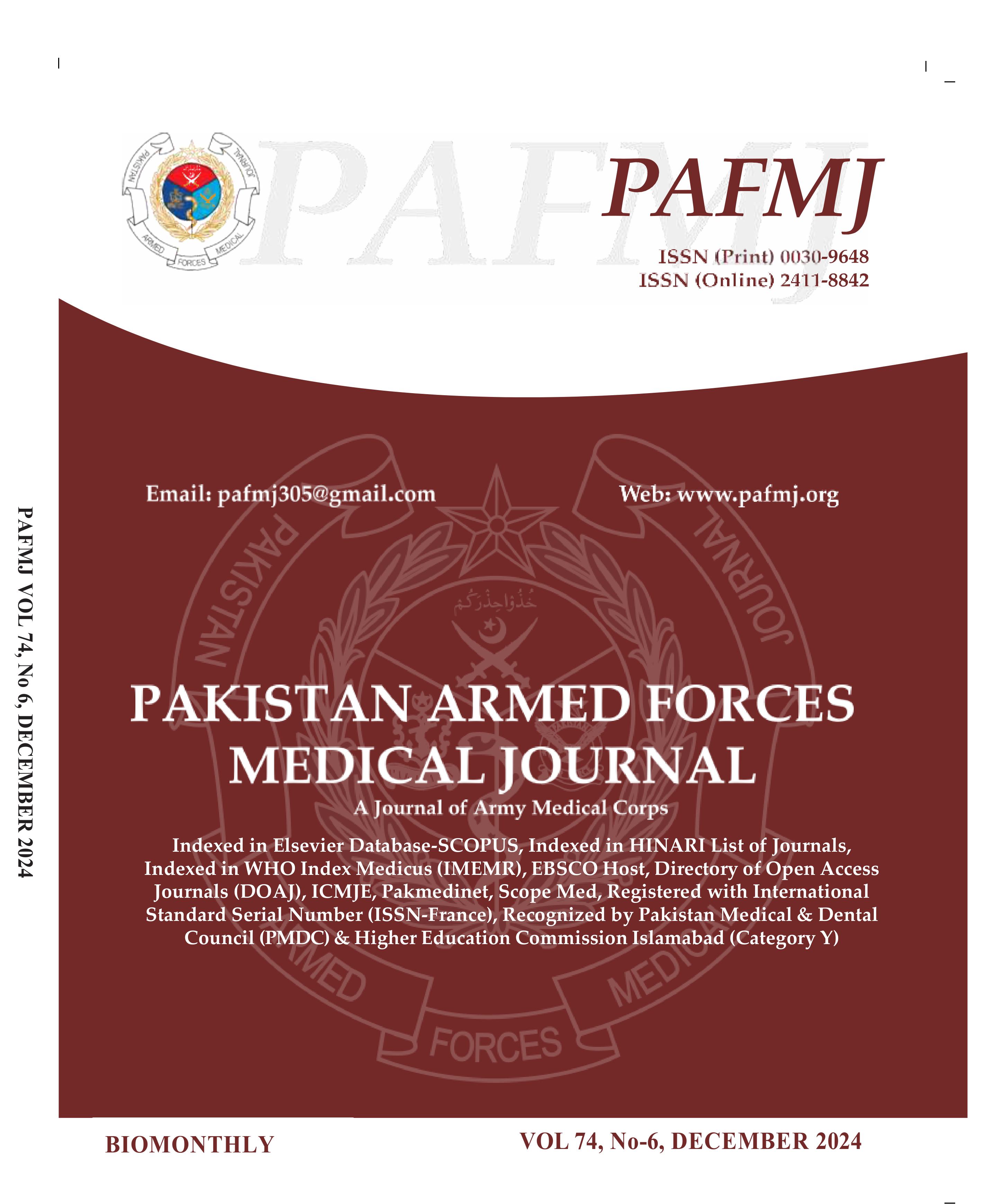Electrothermal Vessel Sealing a Time Saving Alternative to Classic Suturing in Total Abdominal Hysterectomy; A Retrospective Study
DOI:
https://doi.org/10.51253/pafmj.v74i6.12459Keywords:
Conventional Sutures, Electrocoagulation, Total Abdominal HystrectomyAbstract
ABSTRACT
Objective: To analyze efficacy of Electrothermal Vessel Sealing in comparison to Conventional Suture Ligation in Total Abdominal Hysterectomy.
Study Design: Quasi-experimental study
Place and Duration of Study: Department of Obstetrics and Gynecology, Pakistan Emirates Military Hospital Rawalpindi, Pakistan from Aug 2022 to Aug 2023.
Methodology: The quasi-experimental study included one hundred and sixty six participants divided into two groups, Group-I had 83 patients while 83 patients were placed in group-II. Group-I received Ligasure and group-II received conventional suturing while undergoing total abdominal hysterectomy. Primary outcomes included estimated blood loss, pedicle securing time, surgery duration, post-operative NPO and hospital stay. Secondary outcomes involved need for suture ligation in surgeries with Ligasure.
Results: Median age was for group I was 49(7) for Ligasure and 48(5) for conventional suture. Both groups had median BMI of 25(4) and median parity of 4(1). In the Ligasure group, 58(69.9%) participants had TAH, and 25 (30.1%) had TAH and BSO, while in the conventional suture group, 63(75.9%) had TAH and 20(24.1%) had TAH plus BSO. In the Ligasure group, 49.4% of the participants had AUB as the most common indication, whereas in the conventional suture group, 42.2% had leiomyoma. Notably, there was significantly lower blood loss with Ligasure (90 vs. 200 ml, p-value 0.001), as well as a shorter duration of surgery (35 min vs. 65 min, p-valu
Conclusion: Ligasure was found to be advantageous over conventional suture in terms of perioperative surgical outcomes for total abdominal hystrectomy.
Downloads
References
Allotey JK, King AH, Kumins NH, Wong VL, Harth KC, Cho JS, et al. Systematic review of hemostatic agents used in vascular surgery. J Vasc Surg 2021; 73(6): 2189-2197.
https://doi.org/10.1016/j.jvs.2020.10.081
Cheng H, Clymer JW, Chen B, Sadeghirad B, Ferko NC, Cameron CG, et al. Prolonged operative duration is associated with complications: a systematic review and meta-analysis J Surg Res 2018; 229: 134-144.
https://doi.org/10.1016/j.jss.2018.03.022
Hussen I, Worku M, Geleta D, Mahamed AA, Abebe M, Molla W, et al. Post-operative pain and associated factors after cesarean section at Hawassa University Comprehensive Specialized Hospital, Hawassa, Ethiopia: A cross-sectional study. Ann Med Surg 2022; 81: 104321.
https://doi.org/10.1016/j.amsu.2022.104321
Karande VC. LigaSure™ 5-mm Blunt Tip Laparoscopic Instrument. J Obstet Gynaecol 2015; 65(5): 350-352.
https://doi.org/10.1007/s13224-015-0745-2
Thobani H, Shah MM, Ehsan AN, Khan S. Much room for change: access to surgical care for stateless individuals in Pakistan. Global Health 2023; 19(1): 93.
https://doi.org/10.1186/s12992-023-00972-3
Rafique A, Hameed F, Jameel MK, Alam H, Arshad HS, Kaleem A, et al. Ligasure Vessel Sealing Versus Conventional Suture Ligation in Thyroidectomy. Esculapio 2023; 19(01): 3-8.
https://doi.org/10.51273/esc23.251911
Naz S, Khan U, Jan H, Khan NS, Shahzad T, Farooq M. Comparison of Haemorrhoidectomy Using Ligasure with Open (Milligan Morgan Haemorrhoidectomy). Pak J Med Health Sci 2022; 16(04): 84. https://doi.org/10.53350/pjmhs2216484
Ulubay M, Kıncı MF, Pay RE, Dede M. Electrosurgical bipolar vessel sealing versus conventional clamping and suturing for total abdominal hysterectomy. Pak J Med Sci 2021; 38(1). https://doi.org/10.12669/pjms.38.1.4197
Essadi F, Elmehashi M, Sharkasi A, Ataweel SM. Ligasure versus traditional suture ligature in abdominal hysterectomy. Fertility and Sterility 2009; 92(3): S124.
http://doi.org/10.1016/fertnstert.2009.07.1152.
Singh H, Jindal M, Gupta M, Goraya SPS, Behal M, Tanjeet. Comparative evaluation of abdominal hysterectomy by Ligasure and conventional method. Int J Reprod Contracept Obstet Gynecol 2017; 6: 5587-5591.
http://doi.org/10.18203/2320-1770.ijrcog20175286.
Wang K, Wu H, Li D, Liu W, Hao Q. Clinical efficacy of Ligasure vessel sealing system combined with total abdominal hysterectomy in treatment of cervical carcinoma. Int J Clin Exp Med 2017; 10(3): 5429-5434.
Dubey P, Dube M, Kanhere A, Biswas N, De R, Koley A, et al. Electrothermal Vessel Sealing Versus Conventional Suturing in Abdominal Hysterectomy: A Randomised Trial. Cureus 2023; 15(1): e34123. https://doi.org/10.7759/cureus.34123
Caltekin M, Aydogmus S, Yalcin S, DEMirEl E, Unay F, Ozbay P, et al. Comparison of three different new bipolar energy modalities and classic bipolar in Vivo for tissue thermal spread. Turk J Pathol 2017; 33(2). https://doi.org/10.5146/tjpath.2016.01377
Mohamed M, Eid S, Ayad W, Emam A. Comparative Study of Electrosurgical Bipolar Vessel Sealing Using Ligasure versus Conventional Suturing for Total Abdominal Hysterectomy.Int J Med Arts 2020; 2(4): 698-704.
https://doi.org/10.21608/ijma.2020.22113.1079.
Bakacak Z, Bakacak M, Uzkar A, Yazar F, Yaylalı A, et al. The efficacy of LigaSureTM open instruments in cases of cesarean hysterectomy due to placenta percreta: a retrospective, record-based, comparative study. J Maternal-Fetal Neonatal Med 2021; 34(6); 960–965.
https://doi.org/10.1080/14767058.2020.1846177
Lauroy A, Verhaeghe C, Vidal F, Parant O, Legendre G, Guerby P. Perioperative outcomes using Ligasure compared with conventional technique in peripartum hysterectomy. Arch Gynecol Obstet 2020; 301(1): 229-234.
https://doi.org/10.1007/s00404-019-05398-0
TÜRKÇÜOĞLU I, Kafkasli A, Doğan C, Tanrikut E. Tissue damage in abdominal hysterectomy performed with a vessel sealing system. Turk J Med Sci 2012; 42(3): 471-476.
https://doi.org/10.3906/sag-1101-1469.
Cetin A,Askin Y,Burcu K,Hakan Y,Ismail K,Ferit S; Efficacy of Electrosurgical Bipolar Vessel Sealing for Abdominal Hysterectomy with Uterine Myomas More than 14 Weeks in Size: A Randomized Controlled Trial. Gynecol Obstet Invest 2012; 73(4): 326–329.
https://doi.org/10.1159/000336400
López JM, Kuba EO, Ruiz VG, Rosas HR, García RH. Sutureless abdominal hysterectomy. Cirujano Gen 2007; 29(4): 269-273.
Schilder J, Anderson D, Shah F, Holcomb B, Shah A, Fullarton G, et al. Hemostatic efficacy of an advanced bipolar sealer in open gynecologic, thoracic, and colectomy procedures: a prospective cohort study. Int J Surg Open 2020; 24: 57-63.
Downloads
Published
Issue
Section
License
Copyright (c) 2024 Sadaf Zohra, Shazia Firdous Chohan, Wajeha Najeeb, Naima Komal, Rabia Mohsin, Abida Islam

This work is licensed under a Creative Commons Attribution-NonCommercial 4.0 International License.















